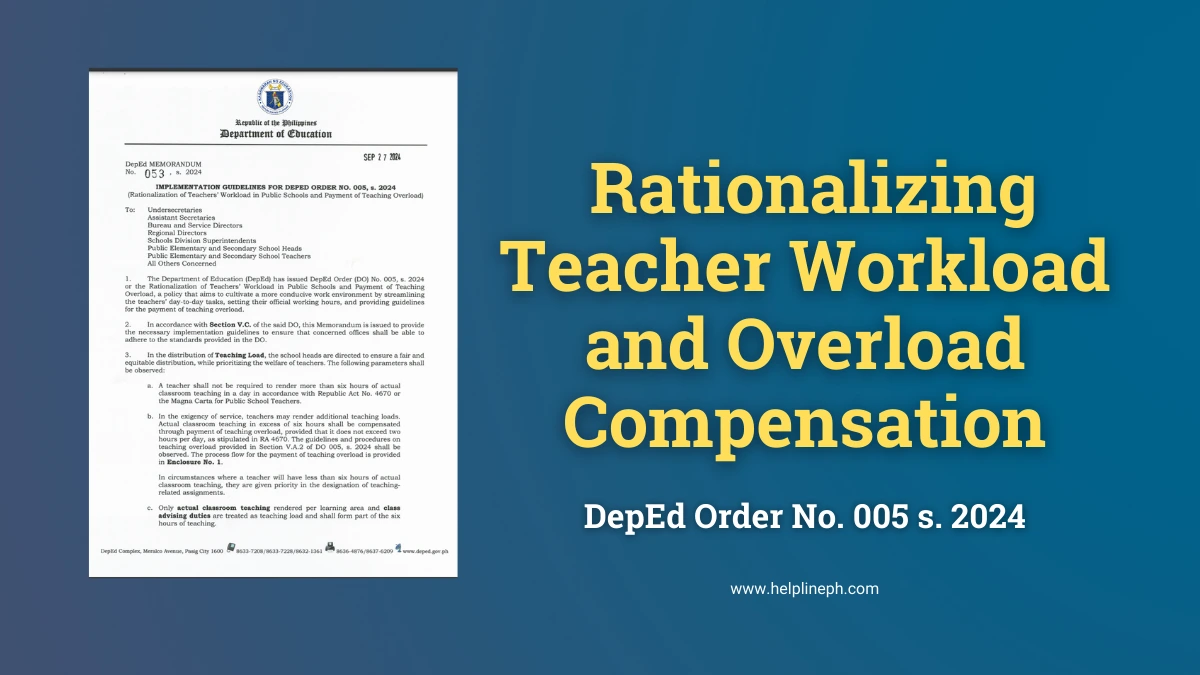The Department of Education (DepEd) recently issued DepEd Order No. 005, s. 2024, which introduces a policy aimed at making teachers’ work environments more manageable. This policy streamlines daily tasks, sets working hours, and provides guidelines for paying teachers when they take on extra teaching loads. To ensure a smooth implementation of this order, DepEd Memorandum No. 053, s. 2024 was released to provide clear instructions to schools.
Summary of the Guidelines for Teaching Load Distribution
School heads must distribute teaching loads fairly, prioritizing teachers’ welfare. The following key points outline the teaching load distribution guidelines:
- Six-Hour Classroom Teaching Limit: According to the Magna Carta for Public School Teachers (RA 4670), teachers should not be required to teach more than six hours a day.
- Teaching Overload and Compensation: If needed, teachers can take on extra teaching hours beyond the six-hour limit, but only up to two additional hours per day. These extra hours are considered teaching overload and must be compensated. The guidelines for this are in Section V.A.2 of DO 005, s. 2024.
- Designation of Teaching-Related Tasks: If a teacher’s classroom teaching is less than six hours, they may be given teaching-related assignments.
- What Counts as Teaching Load: Only actual classroom teaching and class advising duties are counted towards the six-hour teaching load.
- Intervention Programs: Teachers must have time for intervention programs like remediation or enhancement classes. These programs are also treated as part of their teaching load.
Ancillary Tasks Within an 8-Hour Workday
Teachers are required to complete an 8-hour workday, which includes teaching and other tasks, also known as ancillary tasks. Here’s how to handle these tasks:
- Completion of Daily Working Hours: Teachers who complete six hours of classroom teaching are considered to have met their daily working hours. They should not face salary deductions, as stated in Section 2.C. of DO 16, s. 2009.
- Accounting for Ancillary Tasks: While teachers do not need to submit reports for the two hours of ancillary tasks, there must still be a way to account for their work, according to the Civil Service Commission Resolution No. 080096. This can include:
- Logging Out: Teachers who leave school during free periods for ancillary tasks must log their reason in the school’s logbook or fill out a locator slip. Copies of these documents should be attached to their Daily Time Record (DTR).
- Certificate of Undertaking: If teachers perform tasks before or after their assigned classes, they should submit a certificate of undertaking.
- Monitoring Teacher Outputs: School heads, with the help of master teachers, will use methods like lesson plan reviews and class observations to ensure teachers are fulfilling their responsibilities.
Guidelines for Teaching-Related Assignments
Assignments are based on the school’s needs as identified in its School Improvement Plan (SIP) or Annual Improvement Plan (AIP). Here’s how to assign these tasks:
- Planning and Identification: School heads identify teachers for assignments during the start-of-year planning activities, considering teachers’ workload and specializations.
- Voluntary Assignment: Teachers must agree to the assignment and the scope of duties before being designated.
- Designation Order: Once a teacher agrees, the school head prepares a Designation Order, which is submitted to the Office of the Schools Division Superintendent for approval.
- Prioritize Teaching: Teachers with designated assignments should still prioritize their regular teaching duties.
- Vacation Service Credits (VSC): Work done beyond the six-hour teaching load for these assignments will be compensated with Vacation Service Credits (VSC).
Adherence to Workload for Non-Teaching Personnel
While this order focuses on teachers, non-teaching personnel must also stick to their job descriptions. School heads should make sure everyone follows the guidelines set in their roles.
Monitoring and Support
- Dissemination of Materials: All related materials, templates, and procedures can be accessed online for teachers and school administrators. Updates to these materials will be communicated as needed.
- Implementation Team: Schools Division Offices will form a team to monitor and support schools in implementing these guidelines. This team includes division office heads and other key members.
- Communication: Schools can contact the Bureau of Human Resource and Organizational Development-School Effectiveness Division for more information.
Downloadable Templates
DepEd has provided downloadable templates to help with the implementation of these guidelines. These include:
- Certificate of Undertakings
- Locator Slip
- Individual Accomplishment Report for Teaching-Related Assignments
- Authority to Render Work Beyond Regular Working Hours
Frequently Asked Questions (FAQs)
What happens if a teacher is asked to teach more than six hours?
Teachers can teach up to two extra hours beyond the six-hour limit, and they will be compensated for this teaching overload as outlined in the guidelines.
What counts as part of the six-hour teaching load?
Actual classroom teaching and class advising duties count toward the six-hour load. Intervention programs can also be included if they are part of the class program.
Can teachers leave the school during free periods for ancillary tasks?
Yes, but they must register their reason in the school’s logbook or complete a locator slip, and attach this to their Daily Time Record (DTR).
What if a teacher does not want a teaching-related assignment?
Teaching-related assignments are not mandatory. Teachers must agree to the assignment before it is designated.
How will teachers be compensated for work done beyond the six-hour teaching load?
Teachers will receive Vacation Service Credits (VSC) for work beyond the six-hour teaching load for their teaching-related assignments.
Where can I find the templates and materials related to these guidelines?
All materials and templates are available online through the provided link: bit.ly/TeacherWorkload_ToolsandProcedure.
By following these guidelines, DepEd aims to improve the working environment for teachers, ensuring they are not overburdened and are fairly compensated for their work.






